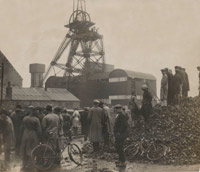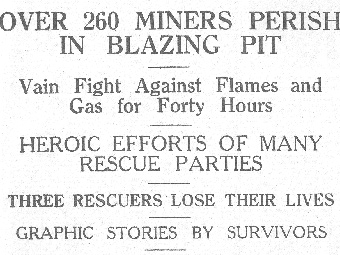|
![Gresford Colliery [click for larger image]](sitebuildercontent/sitebuilderpictures/.pond/gresford_colliery1930s.jpg.w300h207.jpg)
|
| Gresford Colliery as it appeared prior to The Disaster. ca. 1930 |
ER COF
AM Y 266 O LOWYR A GOLLODD
EU BYWYDAU YN NHANCHWA
GWAITH GLO GRESFFORDD
MEDI 22ain 1934
IN MEMORY
OF THE 266 MINERS
WHO LOST THEIR LIVES
IN THE
GRESFORD COLLIERY DISASTER
22nd SEPTEMBER 1934
At about 2am, in the morning on Saturday 22nd September 1934, an explosion occurred in the Dennis Section of Gresford Colliery,
just outside Wrexham, in Denbighshire, Wales. It was at the time when many of the men might have been taking their break in
the middle of the shift that had started the night before, on Friday 21st September at 10-00pm. Some 800 children lost their
fathers and more than 200 women lost their husbands and sweethearts.
One of the most appalling disasters in the history of British mining occurred at the Gresford Colliery, owned by the Westminster
and United Collieries Group. The mine operated in two main sections, the Dennis and the Slant. The explosion occurred in the
Dennis, one of the deepest pits in the North Wales coalfields. The Dennis Main Deep was ruptured by the explosions, and many
miners would have been flung across the pit roads, some of them dying instantly. Others were burnt alive, gassed, asphyxiated
or crushed to death. There is no doubt that there were others trapped alive with no means of escape who were the victims of
later explosions and the release of more gas, and who were dead before they were entombed forever by the sealing of the mine
by their colleagues.
Only six men in the Dennis survived the explosion.
Within a few hours of the first explosion, more than 1000 men had assembled at the pithead in the cold and pouring rain,
waiting to help their comrades, sealed behind a wall of fire, two miles from the bottom of the downtake shaft. This needs
to be understood in the context of the times and the communications technology of the day.
The Chronicle reporter writes "As the pit cage wheels turned, the large crowds were scattered over the pit banks,
and all over the colliery yard, and the highest bank was thick with silent men standing in the rain, waiting and watching.
The saddest confirmation was soon available. The wheels of the winding shaft began their revolutions once more, and I saw
two of the rescue party brought up - dead". There was a call for 20 volunteers, and 100 men stepped forward. Nobody spoke.
The women stood quietly in the rain.
Shortly after 8-00pm on Sunday night, the following official statement was issued :
 |
 |
|
Sunday September 23 1934, 7-45pm "The attempt to overcome the fire in the main road has gone on continually since yesterday,
but in spite of very strenuous efforts, and although some progress has been made in this road, the fire has got a further
hold in a road to the right, through which it was hoped access would have been got to any possible survivors. "Today several
explosions in bye of the fire in the main road have occurred, and this afternoon they became more frequent and closer to where
the men were working on the fire. "The return air in both main returns is carrying carbon-monoxide in dangerous quantity,
and it is with great reluctance that all parties - the management, the representatives of the miners and H.M Inspectors -
have come to the conclusion that no person can possibly be alive in the workings. "In these circumstances and in view of the
increasingly grave risk to the men combating the fire, it has been decided that it would not be right to continue to expose
these workers to such serious risk, and all persons have been withdrawn from the mine
|
|
H. DYKE DENNIS, EDWARD JONES, H.WALKER
|
|
 |
 |
Some 260 men were entombed behind a wall of fire and for two days, brave men fought to reach their entrapped colleagues -
and then came the dreaded decision to withdraw the would-be rescuers and seal the pit shaft with the men inside.... and so
the inevitable happened ... the mine was sealed, and it stays so today ... more than fifty years on ... the roads and shafts
burnt and collapsed, forever entombing the bodies of 256 men and boys .... "don't send your sweethearts down a dark,
dreary mine ... they'll be lost like the souls in hell".
Sir Stafford Cripps lead the investigation into the disaster, and this inquiry ended two and a half years later, when
the report was tabled in Parliament. In 1937, proceedings were started against the Manager of the mine, the under Manager,
firemen individually and jointly against United and Westminster Collieries Limited, and hearings commenced on 20 April 1937
at Wrexham County Petty Sessions Court.
The Gresford Colliery continued to be worked, but not the Dennis Section. Mining at Gresford in the Slant District continued
until 23 October 1973, but the pit was closed officially on economic grounds on 10 November 1973.

The Gresford Disaster
You've heard of the Gresford Disaster,
Of the terrible price that was paid;
Two hundred and forty two colliers were lost,
And three men of the rescue brigade.
It occurred in the month of September
At three in the morning the pit
Was racked by a violent explosion
In the Dennis where gas lay so thick.
Now the gas in the Dennis deep section
Was heaped there like snow in a drift,
And many a man had to leave the coal-face
Before he had worked out his shift.
Now a fortnight before the explosion,
To the shotfirer Tomlinson cried,
"If you fire that shot we'll be all blown to hell!"
And no one can say that he lied.
Now the fireman;s reports they are missing
The records of forty-two days;
The collier manager had them destroyed
To cover his criminal ways.
Down there in the dark they are lying.
They died for nine shillings a day;
They have worked out their shift and now they must lie
In the darkness until Judgement day.
Now the Lord Mayor of London's collecting
To help out the children and wives;
The owners have sent some white lilies
To pay for the poor colliers' lives.
Farewell all our dear wives and children
Farewell all our comrades as well,
Don't send your sons down the dark dreary pit
They'll be doomed like the sinners in hell.
|
 |
|
the list researched and compiled
by Peter Chadwick, Wrexham
a very through and well done job
the page as it appears on our
How Green Was My Valley website
the original page at our
Rise Up Like The Sun website
the memorial to The Disaster
courtesy of Roy Lambert
thanks Roy!
this incredible find is to be found on
the Gathering the Jewels website, a
website for Welsh cultural history
actual news bulletins of the time
from the BBC archives, as read on air
by Stuart Hibbard, the doyen of
BBC announcers
this excellent and well-researched
account, and background materials
courtesy of the
Wrexham Country Borough website
once more Roy Lambert comes through
with this absolutely priceless
documentation

 |
 |
|
|
|
related internet links
|
|
This is the start of a guide
to the village of Gresford.
You'll find links to stories and
photos about Gresford contained
elsewhere on the BBC website
also called 'Gresford'
this moving hymn can be
heard here at the
Lancaster Brass Band's
well put together website.
Thanks lads!
|
|
 |
 |
![Gresford crowd [click for larger image]](sitebuildercontent/sitebuilderpictures/gresford_crowd_1934.jpg)
|
| A crowd waits at the colliery following the disaster |
|
 |
|
|
 |
|
|
|

